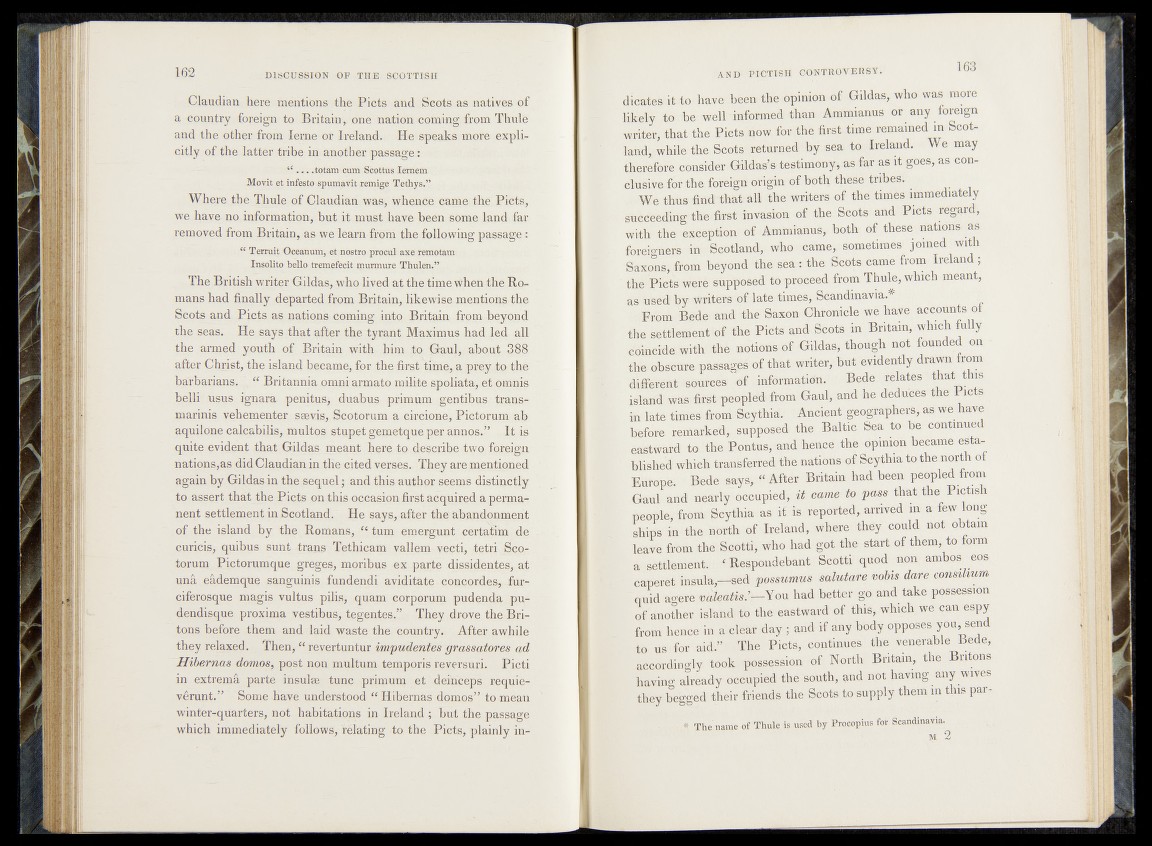
. Claudian here mentions -the Piets and Seots-us natives of
a country foreign to .Britain,, one nation.'coming from Thulg-
and the other from Ierne or Ireland. He speaks more explicitly
of the latter tribe in another passage:
.totam cum Scottus -lernem ,;
Movit et infesto spumavit remige Tethys.”
Where the Thule of Claudian was, whence came, .the. Piets,
we have no information, but it must have-been some land,far
removed from Britain, as we learn from the following passage >:
“ Terruit Oceanum, et nostro procul axe remotam
Insolito bella tremefecit ipi^mur-e Thulen.”
The British writer Gildas, who lived a t the time when the Ramans
had finally departed from Britain, like wise mentions* the
Scots apd Pints as nations coming into Britain fgggr beyond
the seas. He says that after the tyrant Maximus had led all
the armed youth of Britain with him ,to Gaul,;)about
after Christ, the island became, for the first tithe, a p r e y ^ ^ t^ '
barbarians. ^ “ Britannia ,omni arrnato mibte spoliata, et omaajs.
belli usus. ignara penitpsp duabus primum geatibus tram.-*
marinis yehementer saevis, Scotorum a circipne, Pictorumab
aquilone calcabilis^ multos stupet gemetque p ^ a n n ^ ^ * It i^.!
quite evident that Gildas meant Tiere to describe two foreign
nations,as did Claudian in the cited verses. They are mentioned
again by Gildas in the sequel j and this author segms distinctly
to assert that the Piets on this occasion first acquired a permanent
settlement in Scotland. He says, after the abandonment
of the island by the Romans, Ci turn emergunt certanin .de'
curicis, quibus sunt trans Tethicain yallem vecti, tetri Scotorum
Pictorumque greges, moribus ex parte dissiftentes, a t
una efidemque sanguinis fundendi aviditate | Concordes, fur-
ciferosque magis vultus pilis, quam corporum pudenda pu-
dendisque proxima vestjbus, tegentes”p; They drove the Britons
before them and laid waste the country. After awhile
they relaxed. Then^ “ revertuntur impudentes grassatores ad
Hibernas domos, post non multum temporis reversuri. Picti
in extrema parte insulae tunc primum et deinceps requie-
vdrunt.” Some have understood “ Hibernas domos” to mean
winter-quarters, not habitations in Ireland ; but the passage
which immediately follows, relating to the Piets, plainly ind
ic a t^ ik to • h a vw ^ ^ 'th e ,b p « ^ 0 ^ of Gild** who was more
likely b^wel^mf®mh|e,fl;rrthan Antmianus or any foreign
Whiter, th a t« |P f e ts J n o u ft* ij# ^ r e n ia in e d m Scot-
■ lah%; w f i e .'the. So^ ^tramed-* by -sea, tqfdreland. We may
therefore;opnsider Gildnsfs^etim°nyvas fauasvftfghes, as con-
elnSiwfor th
. We thusdirfd-that. allfMevwraftdr-S' of theidimeS' immediately
sueC-eeding^the first invasion of t h 4 |# # p a M ^ i c t s rogardy
b the 'c> x ^m i> o f
fore*rifdntrS©o%n.d, who Pcfcane,? with
4 e \ P i y tW n r 6 s a p p e d ' I
a^iWd^by ■
'-’vFr©in Bede' add 'the Saxon.0hroni|||||56 ha:ve Recounts ©*,
t i :,b t t l e p i # o f and-Scots in ■BMBB
tMofesOthe »passa'gil' o f;^ |#w rite r, but g K B S M B B E H
different dSOurO^ of information. ' B ed o ^ pM fe ljh a t^ th is
p H ^ w ^ ’fiarst.'pl^pled fromh#atd, s
in late' M — BW B B I B i W l i S I hav^
I before I B G B H B the j f M M M i
I B M B B i ,the-Pontusysand « c d f tb e d #™ o n :becSme.^a-
I blished which n°rthO
I Entope. 1 Bede M i M 1 Britain, bad .been, peopled front n
Gaul v a n d 1 riekrly^ocoupied, it earne to B g that the J
p e o p l e , ’from Scythia as if is reported, i f a ^ l e q g
ships in the .north of'Ireland, where they could not obtain
leave from « M who had
a settlement. 4 Respondebant i Scotti quod non]
caperet insula,—sed possumm salutare vo&s.dare eonwhum
“quid ao-ere m W i s .’-Y o n h a d better go and take g B B B i I ofanother island to the eastward of'this, whichwel’can. espy
from hence in a clear day I and if any bbdy oppose^rou; send
to us for aid.’bX The Piets,, continf^s the venerable Bede,
accordingly took 'possesion of North Britain, the B r f tp ^
having already occupied tKe^outh,,sn4 »bt having any .wives
they begged their friends the-Seot^to supply them in this par-
- ! The name of Thule,, is used by Procopius Jg j Scandinayia, M §